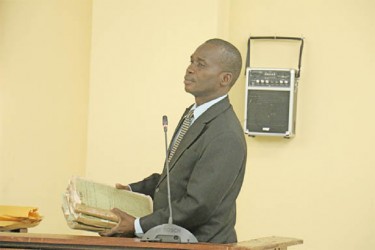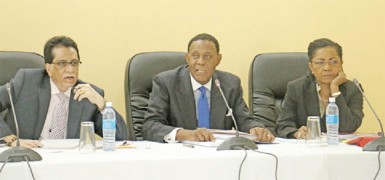Files on the police’s investigation into the 1980 death of political activist Dr Walter Rodney and the operations of his party, the Working People’s Alliance (WPA), were admitted into evidence when the Commission of Inquiry (CoI) held its first public hearing yesterday.
New Crime Chief Senior Superintendent Leslie James was the first witness to take the stand when the public hearings began yesterday at the Supreme Court Library, where less than half of the available seating was filled. He handed over the police files and later, under questioning, said that police did not identify Gregory Smith as a suspect until 16 years after Rodney’s death—a situation he was unable to explain.
Rodney, who was a historian and co-leader of the WPA, was killed in a car near John and Bent streets on June 13, 1980, after a walkie-talkie given to him by Smith exploded.

Despite continued denials, the PNC, the party in government at the time, has long been accused of assassinating Rodney, who had actively opposed it.
Among the CoI’s terms of reference are to determine responsibility for the explosion that resulted in Rodney’s death, and the role, if any, which Smith played as well as who may have helped him to do so and to flee Guyana afterward. It is also to examine the actions and activities of the State, including the Guyana Police Force, the Guyana Defence Force (GDF), the Guyana National Service, and the Guyana People’s Militia, and their possible surveillance of the political opposition for the period January 1, 1978 to December 31, 1980.
James explained that he submitted a total of nine files, including three duplicates, as well as an arrest warrant for Smith. The commission later learnt that seven other files on the WPA’s operations could not be accounted for and their whereabouts seem to be unknown.
Led by the commission’s counsel, attorney Latchmie Rahamat, James said that prior to being the Crime Chief, he was the head of the police force’s Special Branch, which deals with matters of national security and investigates areas of interest to the state, such as treason. This branch of the Guyana Police Force often engages in undercover operations, where ranks infiltrate political activities.

Upon opening one of the brown envelopes he took with him into the witness box, James produced three files from the Special Branch which were labelled “Working Peoples’ Alliance”, 8, 9 and 10, respectively. It was decided that duplicates of the files, which were submitted by James, would remain with the commission, while the original files were returned to him.
Chairman Sir Richard Cheltenham queried the number of the files from the Special Branch and James said that what was recovered were Working Peoples’ Alliance 8, 9 and 10. He said that the number system would have started at one as it was done in numerical order—meaning that there would have been Working People’s Alliance 1, 2, 3, 4, 5, 6 and 7. He said he was unable to find the files numbered 1 to 7 despite checks.
Sir Richard also pointed out the deplorable state of the files and while acknowledging this James said that some work has been done to address the situation and that adequate storage facilities are in place.
James also produced the files he had gotten from acting Police Commission-er Seelall Persaud, who had previously held the Crime Chief post before his promotion. Two of them, he said, were labelled “Death of Walter Rodney,” while the third was labelled the “murder file of accused person Gregory Smith.” He said he had gone through those files and had seen the post-mortem examination report of pathologist Dr Leslie Mootoo, the report of consultant pathologist Dr Hugh Johnson and the report of British forensic scientist Dr Frank Skuse. All three files covered the 1980 period, he said.
He told the commission that he also had in his possession the warrant that was issued for Smith. He said the warrant was issued on June 13, 1996 and the offence listed was murder. The particulars were that Smith, on Friday 13 June, 1980 at Georgetown, murdered Walter Rodney. All six files were later accepted as evidence by the commission after James verified that those were the ones which were handed over by him.
When asked specially about the PME report done by Dr Mootoo, which was contained in one of the files accepted by the commission, he said it was dated June 14, 1980. He said that the cause of death was listed as: one – shock and haemorrhage; and two – multiple injuries to the abdomen and leg due to an explosion.
He said that Dr Mootoo, Dr Johnson and Dr Skuse all arrived “generally” at the same conclusion as to the cause of Rodney’s death.
Asked at what point, the police identified had Smith as a possible suspect, James said that would have been sometime before June 13, 1996. When asked by Commissioner Seenath Jairam SC, what contributed to the 16-year gap, James said that from his understanding Smith was being sought and was never contacted. Pressed for a better explanation as to why it took the police 16 years to come to the conclusion that Smith was a suspect, James said he would be unable to explain. Smith was never arrested and reportedly died in 2002.
Sufficient evidence
Asked if he felt that there was sufficient evidence to charge Smith before speaking to him, James said based on his perusal of the statements and other documents in the files, they were all reasonable to put a case to him.
He said the usual procedure before putting a case of murder to anyone is seeking the advice of the Director of Public Prosecutions (DPP). He said this was done in this case and it was the then acting DPP Ian Chang who advised on the charge in 1996.
James said that to the best of his knowledge, an inquest was not recommended and he was not sure if one was ever held. When told by Jairam that there had been some reference to an incomplete inquest, he said he believed that at some point an inquest had begun but he was unsure if it was completed. He was subsequently showed a document which spoke to an inquest but said that he was unsure if it came from the records that he had.
Chairman of the PNCR Basil Williams, who was present as part of the party’s legal team at the hearing, asked to be advised on the document being referred to. When shown the document, Williams said that it was titled “the Guyana Defence Force.” Rahamat at this point explained that there were several documents which were “bundled” for convenience and the document that was being referred to came from the Guyana Defence Force.
James later said that it was clear that there was an explosion based on the statements that he had read. James also went through the entire summary of Dr Skuse’s report on Rodney’s death.
Answering questions from the chairman, James said there was a National Archives but he expressed certainty that files belonging to the Special Branch would not be stored there. According to James, he was sure of this because all of the files that are pertinent to the Special Branch “will be kept at the Special Branch.”
Rodney’s brother Eddie Rodney is expected to be the first witness to take the stand when the hearings continue today. Among those also slated to give evidence in the coming days are former politician and now human rights activist Karen De Souza, Roman Catholic priest Fr Malcom Rodrigues, trade unionist Lincoln Lewis and a representative of the GDF.




